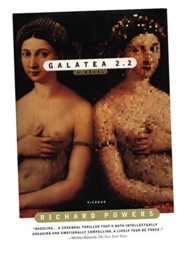Galatea 2.2
¶ by Rob Friesel If asked to condense it to a single sentence, I would say that in essence, Galatea 2.2 is Richard Powers’ novelization 1 of the ideas laid out in Hofstadter’s Gödel, Escher, Bach. That said, I’m uncertain how to respond to this one. After reaching the last page and closing the covers, it left me feeling indicted. Three of five stars?
If asked to condense it to a single sentence, I would say that in essence, Galatea 2.2 is Richard Powers’ novelization 1 of the ideas laid out in Hofstadter’s Gödel, Escher, Bach. That said, I’m uncertain how to respond to this one. After reaching the last page and closing the covers, it left me feeling indicted. Three of five stars?
First, an introduction to Richard Powers 2, a casting into context for us all. There is an element of pretentiousness there, in the language, in the words; Powers paints himself (and the reader along with him) into a corner, a right angle where the pedestrian meets the esoteric. But where I’d graciously forgive David Foster Wallace for the same trespass, Powers’ werk seems a rose’s thorn or a baited barb. He has written an accusation: if you can make it through this then you’re one of them. It’s a bit ugly and probably an unfair assessment. After all, the biographical texts on Powers all seem to indicate that he’d retreated from pursuing a PhD because he did not want to become That Specialist, he did not want to let such a pursuit sterilize literature, steal the pleasure from the reading and the writing.
There is our authorial context, now back to Galatea 2.2:
The novel itself is well-crafted, well-paced. It’s dense. When I first cracked the covers, I thought it would take me the rest of the fall to finish but when I put it down for the first pause, the bookmark was a good twenty pages past my estimate. I became engaged pretty swiftly and in many ways was excited for its progression. Powers treated the science carefully enough; close-up enough to pass the exam but arm’s length enough that no one would mistake him for his own mean-spirited computer scientist, Lentz. And on the novel went, delighting in its own obvious recursive dilemmas. It’s no wonder our author injected himself into the prose, it was the natural extension of the metaphor. Quite expertly done.
And therein lay what I felt was the narrative’s vulnerability: it was tragically humanist. I suppose we can forgive him for that. He tells us up-front that his narrator (his textual doppelgänger) is “the token humanist”, someone from arts-and-letters on safari in the wilds of frontier science. And that is our entry into this Hofstadter-does-Pygmalion visitation. The narration captures echoes from G.E.B., bottles them, decants them through funnels of intriguing synecdoche and filters of carefully-selected citations. I must admit again: quite expertly done. But as Galatea 2.2‘s plot reaches its zenith, the recursion leans full-force into that tragic humanism, turning deterministic while trying to deny it, turning simultaneously naïve and cynical, nearly cheating with its chosen paradox. (And perhaps therein we have Powers concede to Lentz?)
Holding the book in my hands, reading Helen’s cognitive suicide play out, I found myself filled with an odd recognition. It was not the turn I had expected but neither did the development surprise me. For a moment I wondered where I had read this before. Ultimately it was Ram’s judgment that jogged my memory: it shared so many of the same revelations as Aj’s demise in Ian McDonald’s River of Gods. They shared the same spirit of disappointment in us.
- Perhaps dramatization captures more of the correct connotations, however.[↩]
- Wikipedia links always feel dirty, like cheating.[↩]
Leave a Reply